| | | | | | | Presented By Pratt & Whitney | | | | Axios World | | By Dave Lawler · Sep 29, 2022 | | Welcome back to Axios World. - Tonight's edition (1,935 words, 7½ minutes) starts with Sunday's election in Brazil before stops in Russia, the U.K. and the South Pacific.
New arrival? Subscribe. | | | | | | 1 big thing: Lula leads Bolsonaro in Brazil's election of "rejection" |  | | | Towels with images of presidential candidates Luiz Inácio Lula da Silva and Jair Bolsonaro. Photo: Alexandre Schneider/Getty Images | | | | Brazil's election on Sunday could spell the end of Jair Bolsonaro's presidency — or set the stage for a very tense four weeks leading up to a runoff with leftist former President Luiz Inácio Lula da Silva. Driving the news: With Lula leading by at least 7 points in all the latest polls, the big question is whether the former president can secure an outright majority. - If neither candidate hits 50%, as looks likely, the two will square off again on Oct. 30, with Lula heavily favored.
- But Bolsonaro has claimed without evidence that Brazil's electronic voting system can be manipulated, and he said in recent days that if he receives less than 60% of the vote "something abnormal has happened." The far-right firebrand once famously declared that his tenure would end in one of three ways: victory, prison or death.
- Senior Biden administration officials have tried to preempt an electoral dispute by publicly praising Brazil's voting system and engaging Bolsonaro behind closed doors. The Senate last night signaled its concern with a resolution led by Sen. Bernie Sanders (I-Vt.).
The big picture: If Lula is declared the winner, Bolsonaro will almost certainly challenge the result in his rhetoric and potentially in the courts, says Thiago de Aragão of the Brasilia-based Arko Advice consultancy. But de Aragão believes fears of a coup to keep Bolsonaro in power are overblown. - Unlike Donald Trump after the 2020 election, Bolsonaro doesn't have a strong political party behind him in Congress. And despite his administration's close links to the military, the generals have no intention of stepping into the political arena, de Aragão contends.
- Still, Beatriz Rey of the Center for Studies of the Brazilian Congress expects "chaos" if Bolsonaro loses. She said at a recent Wilson Center event that political elites may feel the need to make a post-election deal with Bolsonaro to convince him to leave office.
Meanwhile, a series of politically motivated attacks have increased the sense of foreboding leading up to the vote. - On Saturday, a Bolsonaro supporter allegedly entered a bar, asked who planned to vote for Lula, and fatally stabbed a man who said "I will." In July, another Bolsonaro supporter allegedly shot and killed a man who was holding a Lula-themed birthday party.
- Violence has broken out at rallies for both parties. Bolsonaro was himself stabbed while campaigning in 2018.
State of play: Bolsonaro came to power in part because Lula was banned from running because of corruption convictions that have since been thrown out. Bolsonaro's tenure has been defined by the pandemic, which devastated Brazil, and his constant fanning of culture wars. - While many voters have fond memories of Lula's tenure, which coincided with a commodities boom, he and his Workers' Party are nearly as polarizing as Bolsonaro.
- The theme of this election is "rejection," de Aragão says. Most voters will be casting their ballots against Bolsonaro or Lula.
- Lula, who turns 77 next month, has led consistently in the polls. But his platform is based less on specific policies than on a promise that the good times will return. Lula tends toward pragmatism rather than ideology on economic issues, de Aragão notes.
What to watch: In international affairs, however, Lula could position himself as a leader of the growing club of left-wing leaders in the region. - Lula has also advocated close economic links with China and blamed NATO for Russia's invasion of Ukraine during the campaign.
- So while relations between presidents Biden and Bolsonaro have been awkward — particularly on Biden's core priorities of climate and democracy — a Lula victory would bring challenges of its own for Washington.
|     | | | | | | 2. Putin's escalation I: Annexation announcement is imminent | 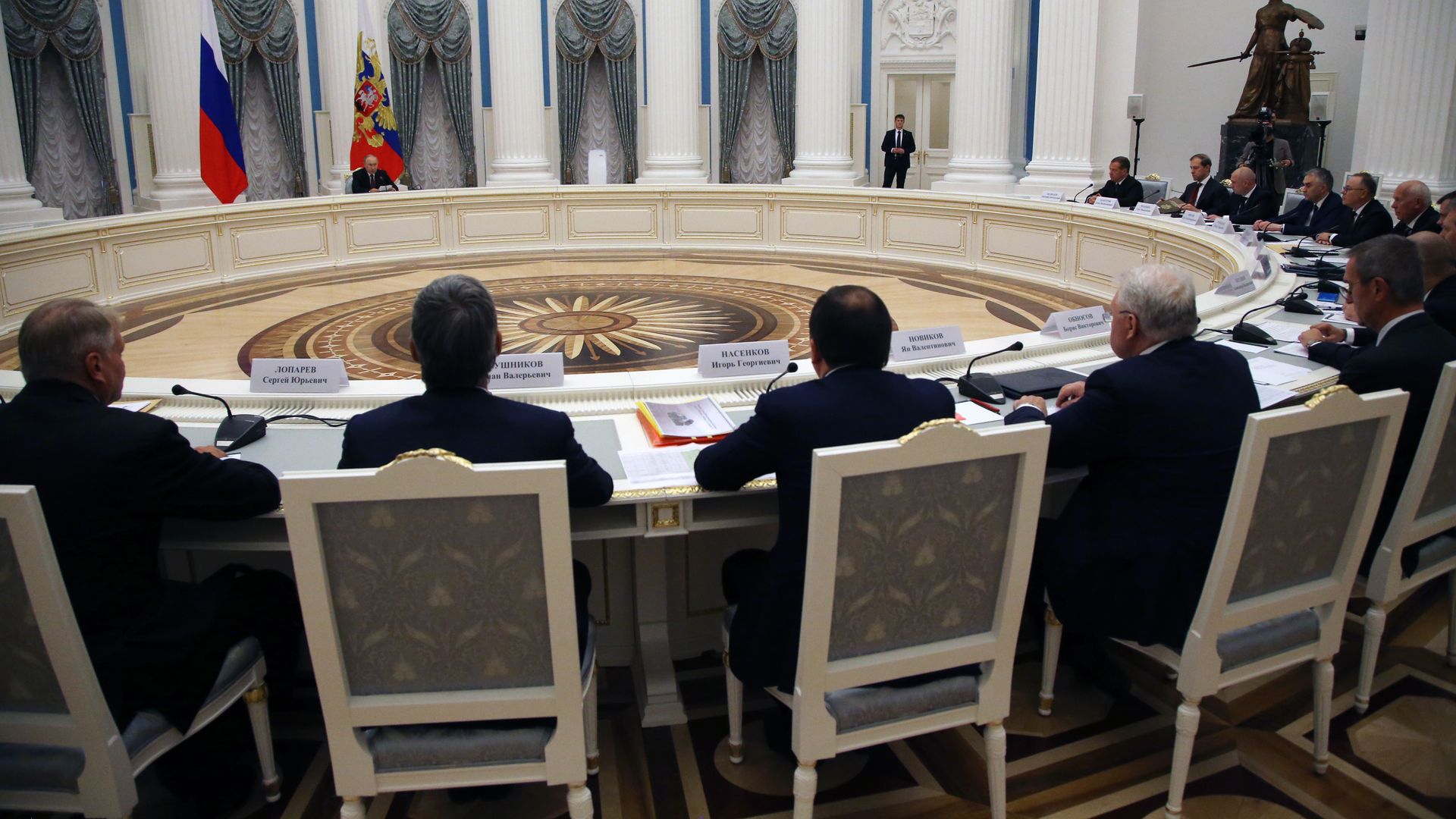 | | | Putin meets members of Russia's military industrial complex (from afar) on Sept. 20. Photo: Contributor/Getty Images | | | | Russian President Vladimir Putin will hold a signing ceremony tomorrow to formally annex four Moscow-occupied areas of Ukraine, the Kremlin said Thursday, following staged referendums in the regions. Why it matters: The expected annexation will dramatically raise the stakes in the occupied regions of Donetsk, Luhansk, Zaporizhzhia and Kherson as Putin could attempt to portray any attack in the areas as an attack on Russia itself. - None of the four regions is entirely controlled by Russia. Ukraine accused Russia of coercing residents, some by gunpoint, into voting for annexation.
- Russian Foreign Minister Sergei Lavrov previously said the annexed areas would have Moscow's "full protection," a signal they could be brought under the nuclear umbrella.
- Ukraine is currently conducting counterattacks in Kherson and elsewhere. Under Putin's formulation, Russia will now deem those battles to be taking place on Russian soil.
The other side: Ukrainian President Volodymyr Zelensky has previously warned that annexation would spell the end of any diplomatic negotiations between Russia and Ukraine. Between the lines: Putin seems to hope, mistakenly, that by putting nuclear weapons on the table he can convince the U.S. to pressure Ukraine to agree to back down, says Alexander Gabuev of the Carnegie Endowment. - But by laying claim to so much Ukrainian territory, he has also raised the bar for victory.
- "Putin views this war as existential for himself, for his personal survival maybe, for his legacy and for his country. And that's why it's just unattainable that he will back down. There is no diplomatic offramp that is visible for him," Gabuev says.
|     | | | | | | 3. Putin's escalation II: Mobilization and potential sabotage |  | | | Mobilization in Moscow. Photo: Sefa Karacan/Anadolu Agency via Getty Images | | | | Putin today acknowledged "mistakes" in the mobilization process and said anyone who was called up despite not meeting the draft criteria "must be sent home." The backdrop: 70% of Russians say they felt fear or alarm as a result of Putin's partial mobilization, and 66% believe full mobilization is possible, according to the Levada Center independent pollster. - The proportions of Russians believing the war isn't going well (31%) and wanting peace talks (48%) also increased in the new poll.
Meanwhile in Dagestan, regional leader Sergei Melikov lambasted draft officers who drove through the city of Derbent demanding that "all male citizens" report to a conscription center. Describing them as "morons," he asked, "Who authorized them?" - Dagestan has reportedly suffered disproportionate casualties in the war, and Putin's mobilization order sparked unrest in the North Caucasus.
The big picture: Alexander Baunov of the Carnegie Endowment describes Putin's Russia as a "country of fences," where citizens sacrifice political rights for security, but keep a fence around their private lives. - Putin has now breached that fence — and violated his "unwritten contract" — by taking "husbands, sons, brothers into the army," Baunov says.
- While people who never openly opposed Putin are fleeing the draft, street protests in Russian cities are still mainly limited to a small pro-Western, anti-war segment of the population, he says.
- Still, Baunov believes Putin's hold on the elite and the general public has weakened.
The latest: |     | | | | | | A message from Pratt & Whitney | | The F135 EEP is the right choice — here's why | | |  | | | | The F135 Enhanced Engine Package (EEP) can deliver the needed capability for Block 4 aircraft faster, cheaper and with less risk than a new, unproven engine. - F135 EEP can also cover power and thermal management system growth to the maximum capability of the F-35 combat aircraft.
Get the details. | | | | | | Bonus: Where in the world? |  | | | Illustration: Natalie Peeples/Axios | | | | Fill in the blank on these historical summits or treaties. Some of these are more obscure than others, but all answers are capital cities. 1. ____ Summit (2018, U.S. and North Korea) 2. ___ Climate Accords (2015, global) 3. Treaty of ___ (2007, EU) 4. ____ Accords (1993, Israel and PLO) 5. ___ Pact (1955, former Eastern bloc countries) 6. ____ Convention (1933, countries of the Americas) 7. Peace of ___ (1921, Poland and Soviet Union) 8. Congress of ____ (1814, European powers) Scroll to the bottom for the answers. |     | | | | | | 4. Things aren't going great for Liz Truss | 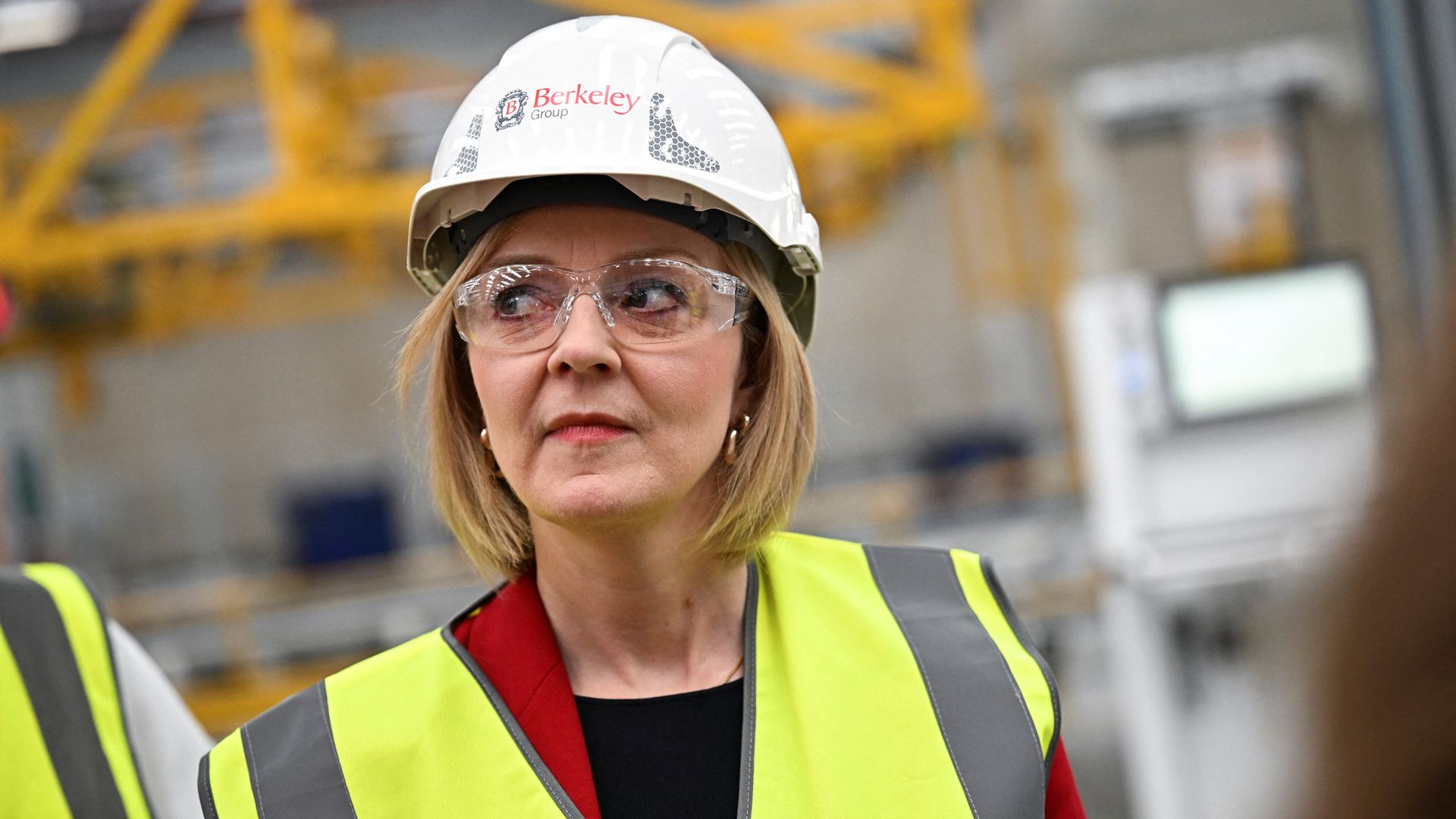 | | | Liz Truss visits a modular housing business last week. Photo: Dylan Martinez/WPA Pool/Getty | | | | New U.K. Prime Minister Liz Truss promised Conservative Party members that if they elected her she'd slash taxes, including for businesses and the wealthy, to stimulate growth. - With energy prices soaring, though, she had little choice but to offer massive government assistance to help households and businesses keep the lights (and heating) on.
How it happened: Truss and Chancellor of the Exchequer Kwasi Kwarteng decided to do both at the same time, deficits be damned. - The package Kwarteng laid out on Friday sent the pound plummeting to a record low against the dollar, forced an emergency central bank intervention, and prompted the sort of concerned IMF response typically reserved for debt-laden developing countries.
Driving the news: Criticized for her initial silence as the economy tanked, Truss appeared on eight local radio stations today. But her halting answers gave further fuel to the opposition. - "Liz Truss has finally broken her long painful silence with a series of short painful silences," Labour Deputy Leader Angela Rayner quipped.
By the numbers: Labour leads the Conservatives by a stunning 33% according to a new YouGov poll, up from 14% when she took office just three weeks ago. - Still, no general election is due for two years. For now, Truss insists she'll stay the course.
Worth reading: Janan Ganesh writes witheringly in the FT that Truss' policies suggest she's confused the U.K. for a superpower. |     | | | | | | 5. Why the Iran nuclear talks are stuck | 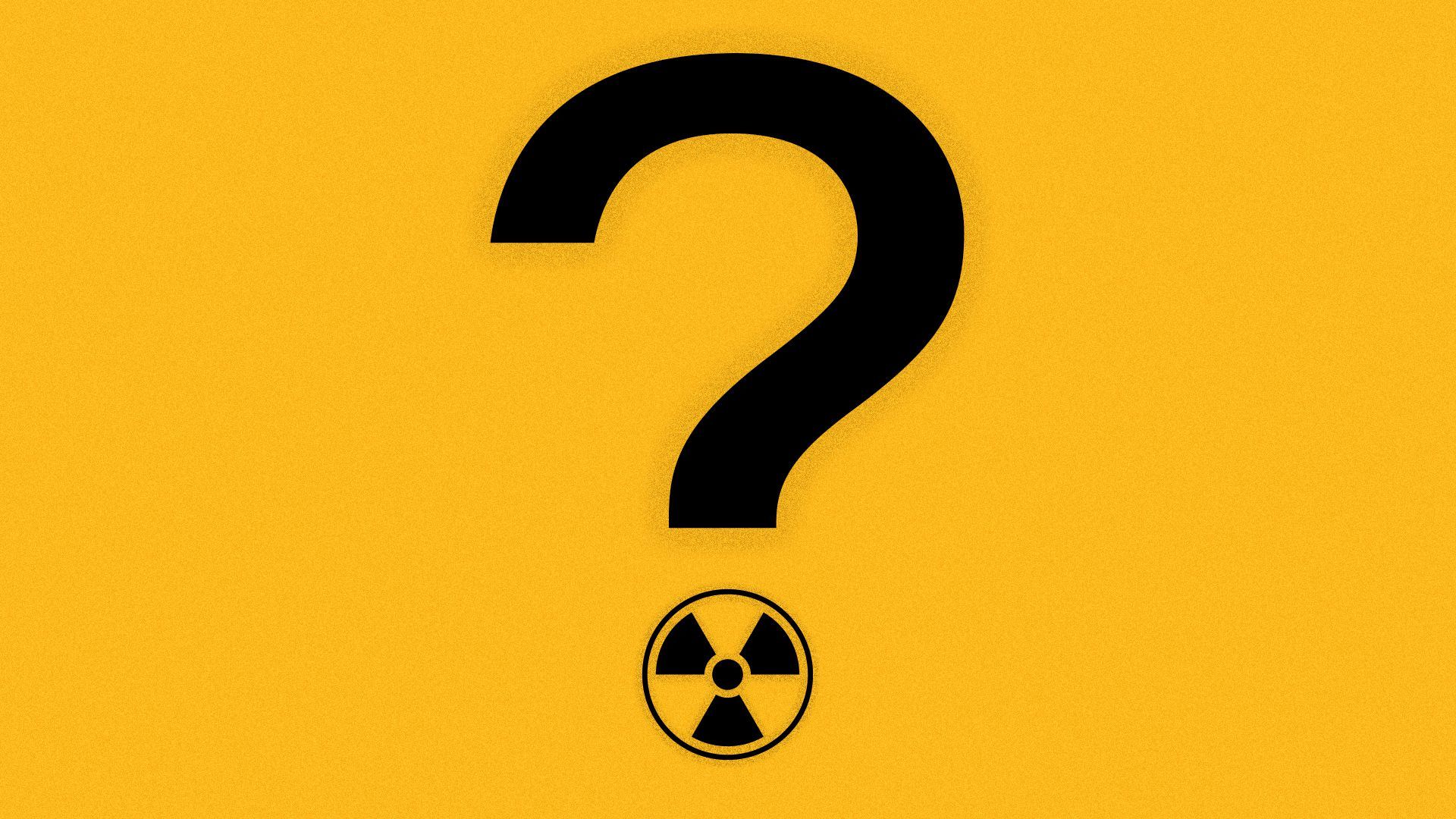 | | | Illustration: Aïda Amer/Axios | | | | Iran's demand that the International Atomic Energy Agency close its investigations into its alleged past undeclared nuclear activity is the last "huge obstacle" to restoring the 2015 Iran nuclear deal, a senior European diplomat tells Axios' Barak Ravid and me. Behind the scenes: Iranian President Ebrahim Raisi focused his address to the UN General Assembly on the need for guarantees that the U.S. won't abandon the deal again. But in private meetings on the sidelines of the summit, his only demands concerned the IAEA probe, according to a senior European diplomat. - That was confirmed by a senior U.S. official who was briefed on Raisi's meetings with French President Emmanuel Macron and European Council President Charles Michel.
Behind the scenes: "At midnight on Aug. 15, we thought we had a deal," the European diplomat told Axios, describing a back-and-forth between Iranian and U.S. proposals that had narrowed in on a few technical issues. - But as they worked to close those issues, the Iranians for the first time made closing the investigations into uranium particles discovered by UN inspectors at undeclared sites a precondition of the deal.
- "Something happened in Tehran. Maybe the highest authority in Iran decided it doesn't want a deal without being sure the investigations will be closed," the European diplomat said.
What to watch: A deal is unlikely prior to the U.S. midterm elections. - "As long as they think [Secretary of State Tony] Blinken can just pick up the phone and tell [IAEA chief Rafael] Grossi to drop it, we won't get a deal," the diplomat said.
Go deeper. |     | | | | | | 6. One to watch: Pacific islands forum | 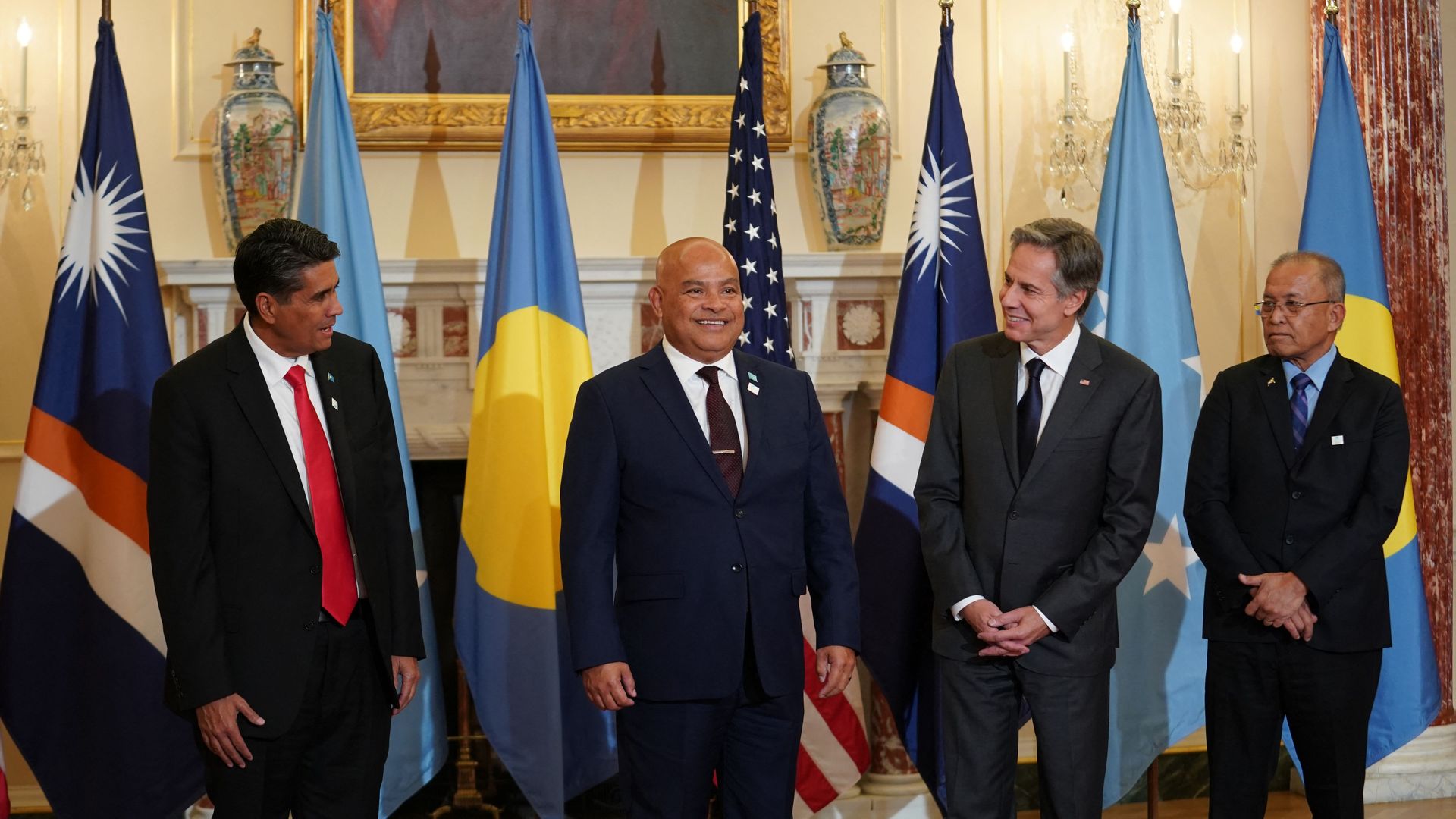 | | | Secretary of State Blinken (2nd right) hosts a multilateral meeting with (from left) the presidents of Palau, Micronesia, and the Marshall Islands in Washington, D.C., Sept. 29. Photo: Sarah Silbiger/Pool/AFP via Getty Images | | | | The Biden administration released a strategy for engagement with Pacific Islands countries today during a two-day summit with regional leaders. - Between the lines: The amount of attention the administration has dedicated to these countries is disproportionate to their populations, but part of a broader effort to compete with China for influence.
- Yes, but: The Solomon Islands — which helped draw the administration's attention to the South Pacific when it signed a security pact with China — declined to endorse a joint statement, per WaPo.
Go deeper: Solomon Islands bars U.S. ship, raising China influence fears |     | | | | | | 7. Stories we're watching | 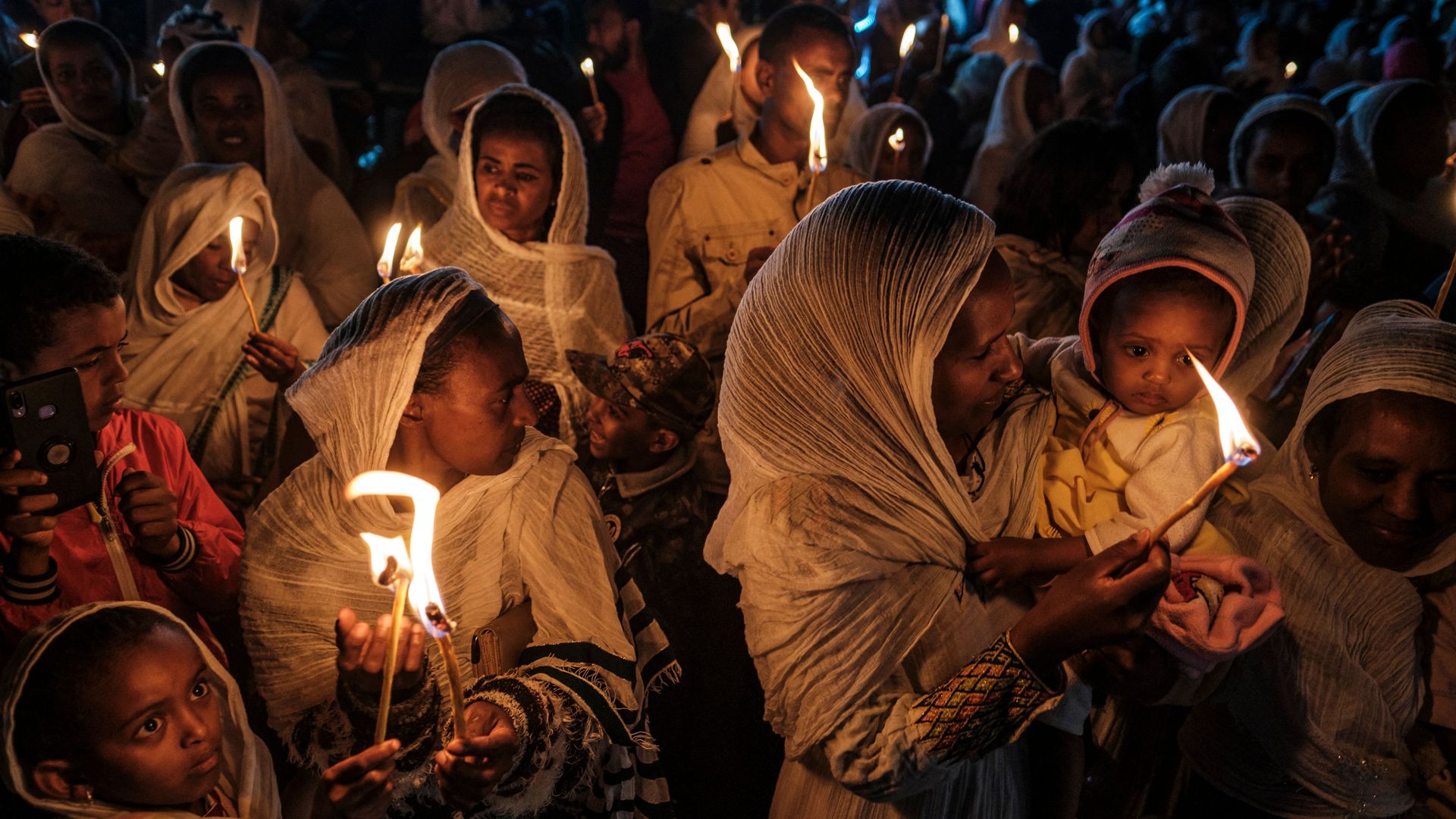 | | | Ethiopian Orthodox devotees celebrate the holiday of Meskel in Addis Ababa. Photo: Eduardo Soteras/AFP via Getty | | | - North Korea launches missile before VP Harris' visit to Seoul
- Netanyahu's bloc makes gains a month out from Israeli elections
- Business World: Meta disables disinfo networks from China & Russia; Porsche races into IPO; Saudi Arabia to invest $37 billion in gaming
- Saudi king names MBS prime minister
- In photos: Hurricane Ian hits Cuba
- Myanmar court sentences Aung San Suu Kyi and Australian economist
- Taiwanese citizens prepare for possible cyber war
Quoted: "This is scaremongering. This is project fear." — Liz Truss in a leadership debate with Rishi Sunak, who warned that excess borrowing would lead to higher mortgage rates |     | | | | | | A message from Pratt & Whitney | | The F135 EEP is the right choice — here's why | | |  | | | | The F135 Enhanced Engine Package (EEP) can deliver the needed capability for Block 4 aircraft faster, cheaper and with less risk than a new, unproven engine. - F135 EEP can also cover power and thermal management system growth to the maximum capability of the F-35 combat aircraft.
Get the details. | | | | Answers: 1. Singapore; 2. Paris; 3. Lisbon; 4. Oslo; 5. Warsaw; 6. Montevideo; 7. Riga; 8. Vienna |  | | Are you a fan of this email format? It's called Smart Brevity®. Over 300 orgs use it — in a tool called Axios HQ — to drive productivity with clearer workplace communications. | | | | | | Axios thanks our partners for supporting our newsletters. If you're interested in advertising, learn more here.
Sponsorship has no influence on editorial content. Axios, 3100 Clarendon Blvd, Arlington VA 22201 | | | You received this email because you signed up for newsletters from Axios.
Change your preferences or unsubscribe here. | | | Was this email forwarded to you?
Sign up now to get Axios in your inbox. | | | | Follow Axios on social media:    | | | | | |













No comments:
Post a Comment